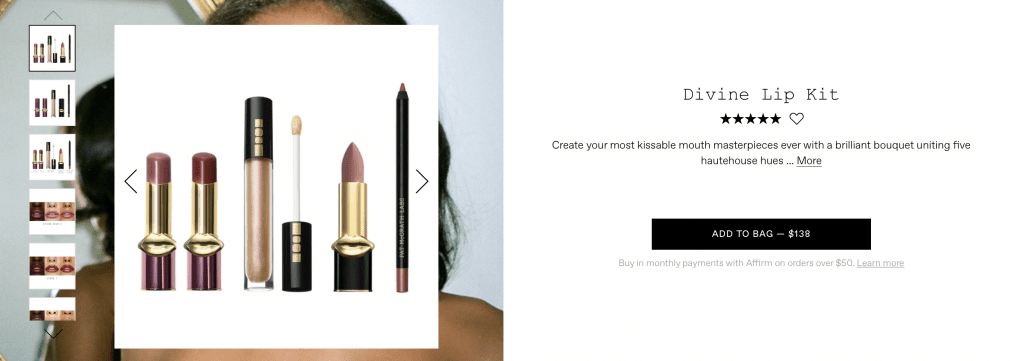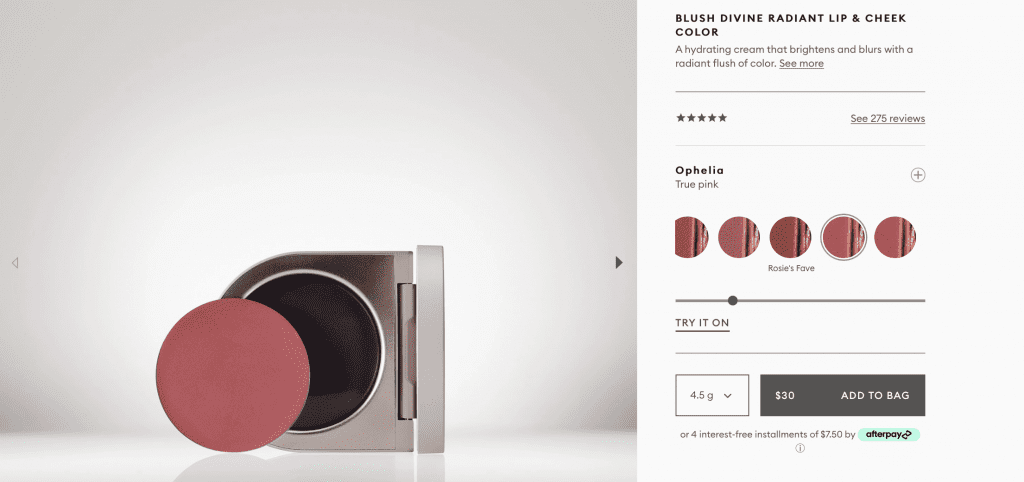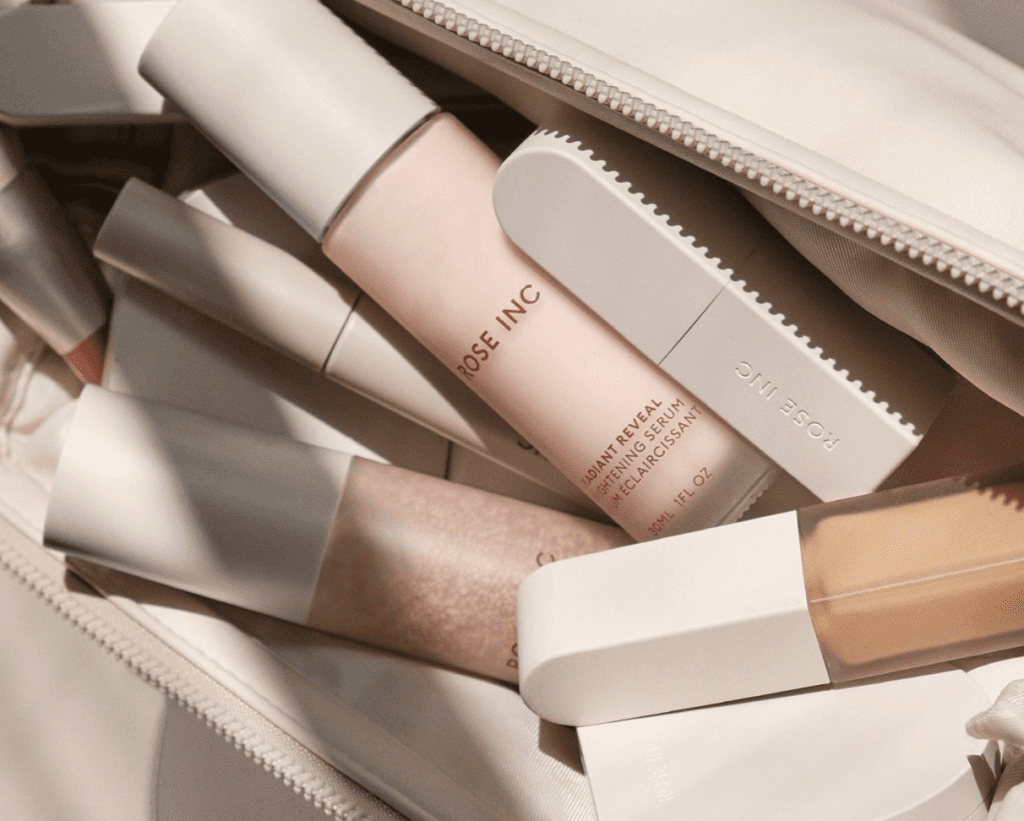Two celebrity-founded brands are sparring over the name of products within their respective collections. In a newly-filed lawsuit, Amyris and Clean Beauty Collaborative, Inc., the parties behind model Rosie Huntington-Whitely’s clean cosmetics brand Rose Inc. are pushing back against threats of trademark litigation waged by Pat McGrath Cosmetics (“PMC”), the eponymous company of one of fashion’s most celebrated makeup artists. According to the declaratory judgment and unfair competition complaint that they filed in a California federal court last month, Amyris and Clean Beauty (the “plaintiffs”) assert that PMC has threated to file suit against them unless they cease their use of the word “DIVINE” on Rose Inc. products.
In the complaint that they filed on January 28, Amyris and Clean Beauty assert that back in September, they received a cease-and-desist letter from counsel for PMC, alleging that Rose Inc.’s “Blush Divine Radiant Cheek & Lip Color” infringes “the Pat McGrath family of ‘Divine’ marks.” In its letter, PMC asserted that these marks “have become associated exclusively with Pat McGrath in the cosmetics industry,” and thus, demanded that the plaintiffs “immediately and permanently stop making, importing, selling, and offering to sell any cosmetic under a DIVINE -formative mark,” and also deliver to PMC “for destruction all existing inventory of the current Blush Divine product and all promotional materials depicting them.”
Despite counsel for both sides engaging in several discussions in January, Amyris and Clean Beauty claim that they have been unable to work out their differences, prompting them to file suit and seek a declaration from the court that “the name ‘Blush Divine Radiant Cheek & Lip Color’ and the associated cosmetic product [on] which it is used, do not infringe upon any of the trademarks or other intellectual property rights of PMC, and to the extent that [PMC does] own any actionable rights to the name ‘DIVINE,’ Rose Inc.’s use of that name is protected fair use.”

Moreover, the plaintiffs are seeking declaratory relief from the court by way of a determination that PMC “does not own protectable rights to a ‘DIVINE-formative’ family of marks.”
Pushing back against PMC’s allegations in their complaint, the plaintiffs argue that the company lacks the requisite trademark rights in “DIVINE” and the alleged family of “DIVINE-formative” marks necessary to wage viable infringement claims. In terms of the “DIVINE” mark on its own, which PMC asserts it has common law rights in for use on cosmetics, the plaintiffs assert that it is a “commonly used term in the cosmetic industry” to “describe hundreds and thousands of products,” such as those offered up by Lilah Beauty, Melt Cosmetics, L’Occitane, and Parfums Christian Dior, which “have been using and continue to use the word ‘divine’ for beauty products, including blush.”
As such, Amyris and Clean Beauty contend that the term is “incapable of uniquely identifying PMC as a source identifier of blush or any other product in the cosmetics industry.”
Even if PMC does not have protectable rights in “DIVINE,” the plaintiffs argue that their use of the word does not infringe those rights, as they are not using the word as a trademark (i.e., as an indicator of source), but instead, as a descriptive term that is protected by the fair use doctrine, and that consumers are not likely to be confused about their use of. On the issue of confusion, the plaintiffs argue that the likelihood is low due to the “widespread use of ‘divine’ as a descriptive or generic part of the names of third-party cosmetics, particularly blush,” which “confirms that customers view the term as descriptive or generic, and that the public is able to distinguish between different marks that include the common terms DIVINE and BLUSH.”
As for the “family” of PMC “DIVINE” marks, namely, “Divine Rose, Divine Skin and Divine Blush,” the plaintiffs call foul here, as well, essentially arguing that PMC does not have rights in the “DIVINE” mark on its own, and the bar for establishing trademark rights is even higher for families – or groups of marks that have a recognizable common characteristic such that the public not only associates the individual marks – but the common characteristic of the family – with the trademark owner, as well.
“A family of marks typically requires many years – if not decades – of use before being recognized by the purchasing public as the common originator of goods within the family,” according to plaintiffs, who allege that “PMC has collectively used … the PMC names together for less than a year,” and has not used any of the individual PMC “family” names for more than three years.
“By claiming ownership to a protectable DIVINE-formative family of marks,” the plaintiffs contend that PMC “has promoted a false or misleading representation of facts about PMC’s ownership rights,” and at the same time, has attempted “to establish a nationwide monopoly in the word DIVINE and assert it against other businesses, creat[ing] a chilling effect in the beauty industry.” Still yet, they argue that this “casts doubt [as to] whether members of the industry can continue to use the generic, highly descriptive or merely descriptive term to convey to customers the useful commercial speech and information about the nature of their products” or whether they will face trademark litigation from PMC as a result.

With the foregoing in mind and given that PMC has allegedly “manifested a clear intention to assert federal and common law unfair competition and trademark infringement claims against [them],” Amyris and Clean Beauty seek the aforementioned declarations from the court, while also arguing that PMC has engaged in unfair competition under California state law. In connection with the unfair competition claims, the plaintiffs are seeking injunctive relief to bar PMC from continuing its wrongful course of conduct,” including asserting “ownership in a protectable DIVINE-formative family of marks,” and enjoining it from “asserting or otherwise enforcing PMC Blush and/or a DIVINE-formative family of marks against [them].”
In terms of the plaintiffs’ likelihood of success, they may have a strong case for arguing that they should be shielded from trademark liability for their use of the term “Divine” in connection with the Rose, Inc.’s Blush Divine Radiant Cheek & Lip Color on the basis that they are not using the term to indicate source but instead, as a descriptive style name.
Anastasia Beverly Hills prevailed in something of a similar case involving fellow beauty brand Hard Candy. In a decision in 2019, the U.S. Court of Appeals for the Eleventh Circuit determined that it had successfully made a descriptive fair use argument in connection with its use of “hard candy,” arguing that it had not used the term “hard candy” in a trademark sense, but “in a descriptive sense because ‘it was used to describe the sheen’ of the makeup shade that the term labelled.”
A rep for PMC did not immediately respond to a request for comment.
The case is Amyris, Inc., et al. v. Pat McGrath Cosmetics, Inc., 3:22-cv-00567 (N.D. Cal.)











